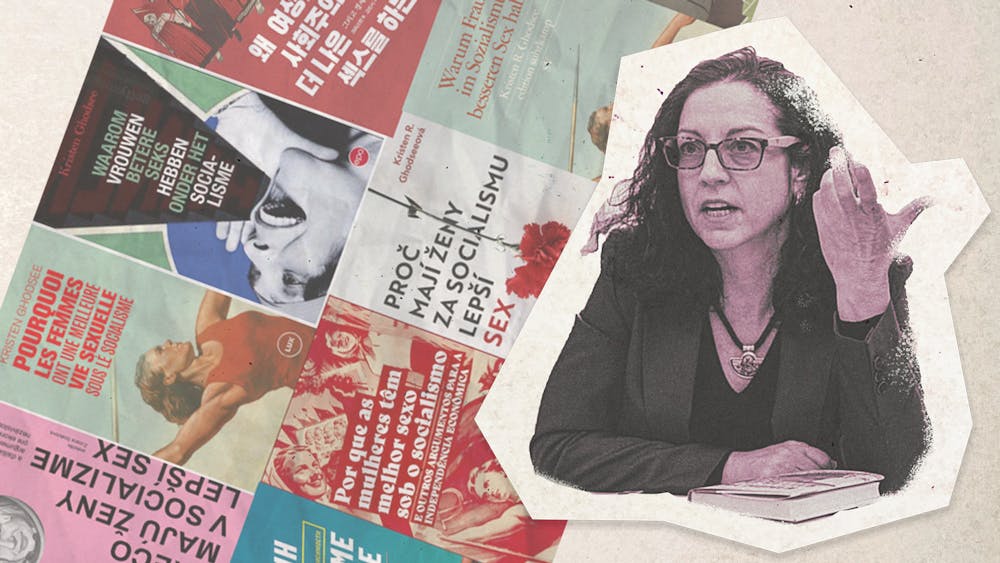What do ECON 0100 and your sex life have in common? It's more than just their complicated statuses.
The answer may not be what you'd expect. “So many people think that capitalism stops at the bedroom door; you close the door and capitalism stays out. Nobody wants to realize that capitalism is actually in bed with us all the time,” says Kristen Ghodsee, a professor of Russian and East European studies at the University of Pennsylvania.
Ghodsee first began to consider the relationship between economics and love in graduate school at the University of California at Berkeley after reading the works of leftist thinker Alexandria Kollontai. “It had never occurred to me that the way that I felt about my friends—later my husband, my child, or my parents—were in any way related to the economic system within which I lived,” she says.
She began to research the ways relationships change based on economic and political systems, namely within capitalist and communist states. Ghodsee looked into surveys conducted during the fall of the Berlin Wall, comparing the communist East to the capitalist West in what is colloquially known as “The Great Orgasm War.” She found that women living under the communist regime in East Germany tended to report greater sexual satisfaction.
“I broadened out and thought, 'Let's talk about love and friendship as well. It's not just about sexuality,'” Ghodsee says. As she expanded her research to other countries and relationships, Ghodsee found similar trends. Under capitalist economies, individuals tend to commodify their relationships into a mechanism of exchange; people might choose their partners—both romantic and otherwise—for economic and social opportunities rather than for the enjoyment of their company. “It turns out that social scientific evidence shows that when we transactionalize different forms of relationships in our life, whether they are filial, friendly, or sexual, they tend to become less satisfying over time,” Ghodsee says.
Alongside teaching a class entitled "Sex and Socialism," Ghodsee's work received national attention in 2017 after publishing a viral New York Times op–ed, “Why Women Had Better Sex Under Socialism.” After receiving a call from a publishing company, Ghodsee expanded the op–ed into a full–length book, which received national acclaim and has since been translated into 14 languages.
Ghodsee’s upcoming book, “Everyday Utopia,” explores radical expressions of love throughout history, from Pythagoras’ communes to cenobitic monasticism. “From the beginning of recorded human history, there have always been groups of people who resist the dominant notion of love, sexuality, and family life,” she says. “I think that there's so much that we in the 21st century can learn from those communities, because it's happening—discussions about polyamory and alloparenting and cooperative care.” Understanding alternative forms of relationships beyond the traditional Western nuclear family is about more than just sex; it offers insight into larger societal issues, such as the modern "loneliness epidemic." “It’s this idea that we can choose our kin and we can live together in healthy and robust networks of love and care with people who aren't our blood relations. And that is something that human beings have been doing forever,” Ghodsee says.
Much of Ghodsee’s research on utopias can be applied to college lifestyles in terms of communal living and unconventional relationships, like “chosen family.” In fact, modern dormitory life is directly modeled on the utopian experiments of Epicurius and Plato. “Minus the student loans, hierarchical politics, status signaling, and all the ugly things that happen at Penn that are ultimately fueled by capitalism,” Ghodsee quickly adds. Even modern hook–up culture can be seen through a utopian lens: “Women are emancipated enough to be able to do whatever they want with their bodies, and it's a community that's conducive to that, which would have made Plato incredibly proud.” Unburdened by expectations of marriage or children, college students have the freedom to connect with a wide network beyond the pre–defined social boundaries of the nuclear home, reimagining definitions of love and care.
But still, despite the utopian opportunities available at Penn, transactional relationships pervade other facets of student life. Pre–professionalism often places an emphasis on encouraging students to build relationships as a means of accessing further opportunities. While networking and coffee chats are often necessary aspects of career–building, turning personal relationships into professional endeavors can leave students feeling unsupported in the long run. “I really think that the transactionality of relationships at Penn is underpinning a lot of the stress and anxiety that Penn students feel,” Ghodsee observes. But there’s a simpler solution than an economic revolution. “Just share more time with people in a nontransactional way. Hang out in your dorm with whatever your choice of beverage and just do nothing—just talk, just share,” she says.
So whether you're having bad sex or just feeling stressed, maybe it's time to send that text: “Hey, want to do nothing with me?”







